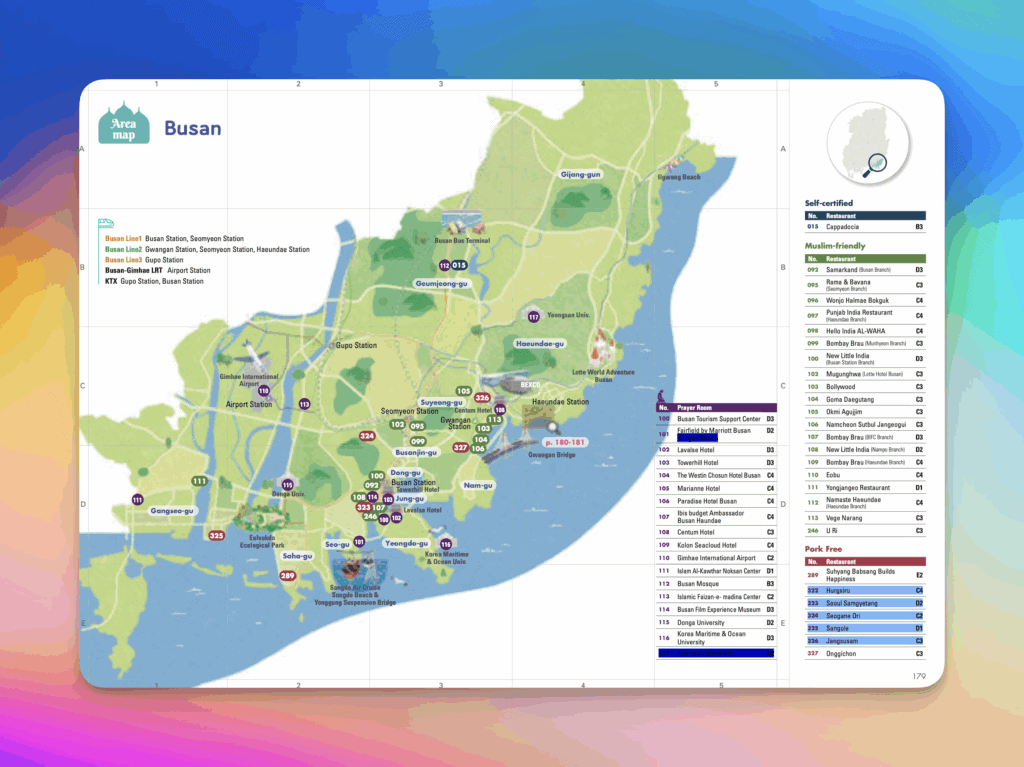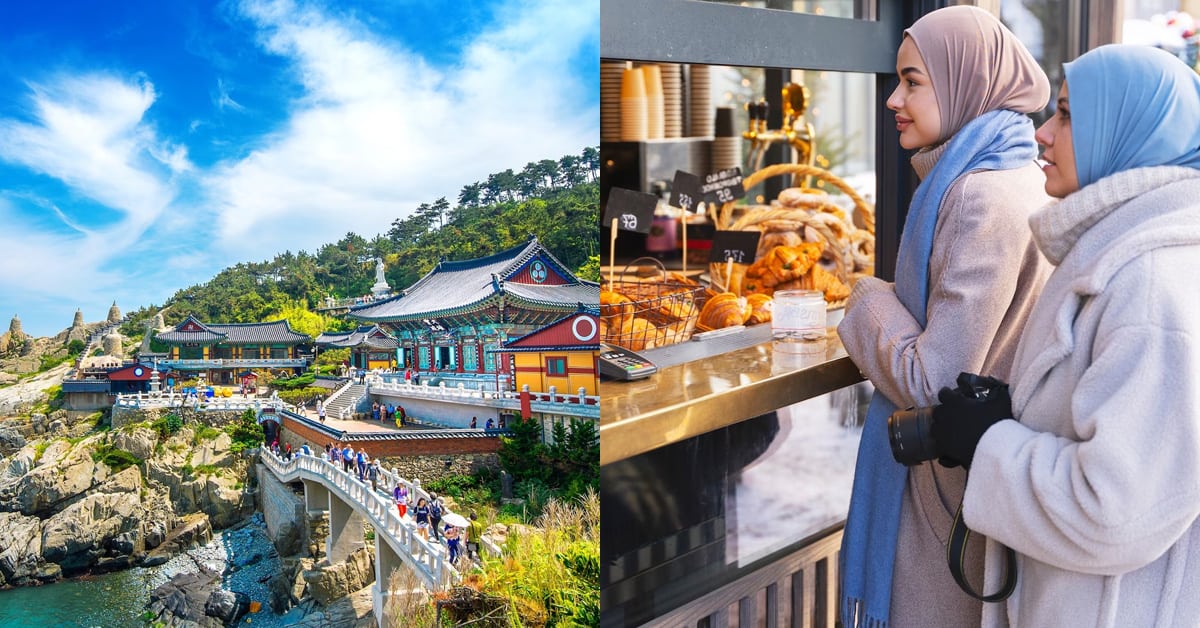Halal food in Busan is accessible through a variety of certified restaurants and Muslim-friendly establishments. While not as extensive as Seoul, Busan offers halal dining options near major attractions, including Indian, Turkish, and seafood restaurants. Key halal food locations in Busan include Haeundae, Seomyeon, and Nampo-dong. Restaurants such as Royal India Haeundae, Cappadocia Turkish Kebap House, and Namaste Haeundae serve halal-certified meals.
The Busan Al-Faith Masjid area also has nearby eateries for Muslim dietary needs. Tourist-heavy districts like Gwangan and Jagalchi Market offer seafood options that are naturally halal if prepared without alcohol or pork. Halal food in Busan complies with Islamic dietary laws and is permissible for Muslims to consume. It typically includes specially prepared meat dishes, vegetarian options, and seafood, which is considered halal.
Halal Restaurants in Busan
What are Halal Restaurants in Busan?
Busan has a variety of halal and Muslim-friendly dining options. Here’s a curated list of the establishments:

Cappadocia Turkish Kebap House
Cappadocia Turkish Kebap House is located near the Al-Fatah Mosque in Geumjeong-gu. Cappadocia offers authentic Turkish cuisine including kebabs, shawarma, and baklava. The restaurant is self-certified halal, ensuring pork-free and alcohol-free meals prepared by a Muslim chef. It’s a popular spot for Muslim travelers seeking familiar flavors.
Samarkand (Busan Branch)
Samarkand restaurant is situated in Busan’s Chinatown. Samarkand serves traditional Uzbek dishes like plov, kebabs, and samsa (meat-filled pastries). The restaurant is Muslim-friendly, offering pork-free meals and a welcoming atmosphere for Arabic, Russian, and Uzbek expats.
Rama & Bavana (Seomyeon Branch)
Rama & Bavana in Seomyeon offers a fusion of Indian and Southeast Asian cuisines, including nasi goreng and tandoori dishes. The restaurant is Muslim-friendly, providing halal options and a pork-free menu.
Wonjo Halmae Bokguk
Wonjo Halmae Bokguk is located in Haeundae. It specializes in pufferfish dishes like bokjiri (clear broth) and bokmaeuntang (spicy stew). While not officially halal-certified, the restaurant offers pork-free options upon request.
Punjab Indian Restaurant (Haeundae Branch)
Punjab Indian Restaurant in Haeundae offers a variety of North Indian dishes such as chicken tikka masala and tandoori chicken. The restaurant is Muslim-friendly, using halal ingredients and operated by a Muslim chef. The owner, Mr. Mubashar, is also helpful in recommending local attractions.
Hello India AL-WAHA
Hello India AL-WAHA is situated in Haeundae. It serves Indian and Arabic cuisine, including lamb and chicken kebabs, shawarmas, hummus, and biryani. The restaurant is halal-certified and offers pork-free and alcohol-free meals.
Bombay Brau (Munhyeon Branch)
Bombay Brau in Munhyeon offers a variety of Indian dishes like butter chicken and chicken tikka masala. The restaurant is Muslim-friendly, providing halal options and a pork-free menu.
New Little India (Busan Station Branch)
New Little India near Busan Station offers a range of Indian dishes, including biryani and naan. The restaurant is Muslim-friendly, offering halal options and a pork-free menu.
Mugunghwa (Lotte Hotel Busan)
Mugunghwa, located in Lotte Hotel Busan, offers Korean cuisine with halal options available upon request. The restaurant is Muslim-friendly, providing a pork-free menu and accommodating dietary preferences.
Bollywood
Bollywood in Busan offers a variety of Indian dishes, including curries and tandoori items. The restaurant is Muslim-friendly, providing halal options and a pork-free menu.
Goma Daegutang
Goma Daegutang specializes in Korean dishes, particularly fish-based soups. While not officially halal-certified, the restaurant offers pork-free options upon request, making it a Muslim-friendly choice.
Okmi Agujjim
Okmi Agujjim offers Korean cuisine, focusing on spicy braised fish dishes. The restaurant provides pork-free options, catering to Muslim dietary preferences.
Namcheon Sutbul Jangeogui
Namcheon Sutbul Jangeogui specializes in Korean grilled fish dishes. The restaurant offers pork-free options, accommodating Muslim diners.
Bombay Brau (BIFC Branch)
Bombay Brau at BIFC offers a variety of Indian dishes, including vegetarian options. The restaurant is Muslim-friendly, providing halal options and a pork-free menu.
New Little India (Nampo Branch)
New Little India in Nampo offers a range of Indian dishes, including biryani and naan. The restaurant is Muslim-friendly, offering halal options and a pork-free menu.
Bombay Brau (Haeundae Branch)
Bombay Brau in Haeundae offers a variety of Indian dishes, including curries and tandoori items. The restaurant is Muslim-friendly, providing halal options and a pork-free menu.
Eobu
Eobu specializes in Korean seafood dishes. While not officially halal-certified, the restaurant offers pork-free options upon request, making it a Muslim-friendly choice.
Yongjangeo Restaurant
Yongjangeo Restaurant offers Korean cuisine, focusing on grilled fish dishes. The restaurant provides pork-free options, catering to Muslim dietary preferences.
Namaste Haeundae (Haeundae Branch)
Namaste Haeundae offers Indian cuisine, including dishes like biryani and naan. The restaurant is Muslim-friendly, offering halal options and a pork-free menu.
Vege Narang
Vege Narang specializes in vegetarian cuisine, offering a variety of plant-based dishes. The restaurant provides pork-free options, accommodating Muslim diners.
U Ri
U Ri offers Korean cuisine, focusing on traditional dishes. The restaurant provides pork-free options, catering to Muslim dietary preferences.
Warung Jaya Mbak Tia
An authentic Indonesian eatery run by Mbak Tia, offering dishes like bakso, nasi goreng, and rendang. Located in Jung-gu, it’s a cozy spot for Southeast Asian flavors.
What Types of Halal Cuisine Are Available in Busan?
Halal cuisine in Busan spans Turkish kebabs, Indian curries, and Korean seafood. Turkish restaurants like Cappadocia serve lamb and chicken kebabs with halal certification. Indian establishments such as Royal India Haeundae offer butter chicken, naan, and biryani. Seafood at Jagalchi Market can be halal if verified with vendors. Some Korean restaurants provide pork-free options, though diners should confirm ingredients beforehand.
Are There Halal-Certified Restaurants in Busan?
Several halal-certified restaurants operate in Busan, including Royal India Haeundae and Bombay Brau. The Korea Muslim Federation (KMF) certifies select eateries, ensuring adherence to halal standards. Self-certified Muslim-friendly spots like Wonjo Halmae Bokguk avoid pork and alcohol but lack formal certification. Travelers should verify halal status directly with restaurants or through reliable halal food apps.
How Accessible Are Prayer Facilities in Busan?
Prayer facilities in Busan are available at the Busan Al-Faith Masjid and Gimhae International Airport. The mosque in Geumjeong-gu accommodates daily prayers and Jumu’ah gatherings. Gimhae Airport’s prayer room on Level 3 provides a space for travelers. Some hotels, like Shilla Stay Haeundae, offer prayer mats upon request, though dedicated prayer rooms are rare.
Which Areas in Busan Are Most Muslim-Friendly?
Muslim-friendly areas in Busan include Haeundae, Seomyeon, and Nampo-dong due to halal dining and prayer access. Haeundae Beach hosts multiple halal eateries, while Seomyeon Station connects to Indian and Turkish restaurants. Nampo-dong’s proximity to Busan Station and the mosque makes it convenient for Muslim travelers. These districts also feature accommodations with halal-friendly meal options.
What Should Muslim Travelers Know About Dining in Busan?
Muslim travelers in Busan should confirm halal status before dining, as not all seafood or vegetarian dishes are automatically halal. Apps like HalalTrip or Muslim Pro help locate certified restaurants. Language barriers may arise, so carrying a halal dining card in Korean is advisable. Opting for clearly labeled halal or vegetarian menus reduces uncertainty.
Are There Halal Food Options Near Busan’s Tourist Attractions?
Halal food near Busan’s attractions includes Namaste Haeundae near Haeundae Beach and Bollywood Restaurant near Seomyeon Station. Gwangalli Beach has Hello India Al Waha, while Jagalchi Market offers seafood verified as halal. Travelers visiting Gamcheon Culture Village can dine at nearby pork-free Korean eateries after verifying ingredients.
How Does Busan Compare to Seoul for Halal Food Availability?
Busan has fewer halal options than Seoul but covers essential needs. While Seoul boasts over 50 halal-certified restaurants, Busan provides around 10 certified spots alongside Muslim-friendly alternatives. Both cities have mosques and airport prayer rooms, but Seoul’s Itaewon district offers more diverse halal cuisine. Busan compensates with seafood and Indian/Turkish specialties.
What Resources Help Locate Halal Food in Busan?
Resources for finding halal food in Busan include the Korea Muslim Federation’s website, halal food apps, and tourism guides. The Busan Tourism Organization lists Muslim-friendly restaurants on its official site. Travel blogs like Have Halal Will Travel provide updated recommendations. Confirming directly with restaurants ensures accuracy, especially for non-certified establishments.
Do Busan Hotels Offer Halal Meal Options?
Some hotels in Busan provide halal meal options, including Shilla Stay Haeundae and The Westin Chosun. Buffets may label pork-free dishes, though cross-contamination risks exist. Booking accommodations with kitchenettes allows self-catering using halal groceries from stores like E-Mart or online delivery services.
Is Busan Muslim Friendly?
Yes, Busan has become more Muslim-friendly because the city has recognized Muslim visitors and residents. This is driven by increasing tourism from Muslim-majority countries and a growing expatriate community. Efforts have been made to accommodate Muslim needs, particularly in hospitality and tourism.
Some hotels in Busan now offer prayer mats and qibla directions in their rooms, and a few shopping areas have prayer rooms. The second-largest city in South Korea has also seen an increase in restaurants offering halal or Muslim-friendly options. However, compared to cities in Muslim-majority countries or some Western metropolises, Busan’s Muslim-friendly infrastructure is still developing.
Is Busan Halal Friendly?
Yes, Busan has been making efforts to become more halal-friendly in response to the growing number of Muslim tourists and residents. The city has seen an increase in halal and Muslim-friendly dining options. Several restaurants, especially in tourist-heavy areas like Haeundae Beach and major attractions, have obtained halal certification or offer halal-friendly menus. The abundance of seafood in this coastal city also provides halal options for Muslim visitors.
Traditional Korean cuisine often includes non-halal ingredients, so Muslims need to be vigilant and inquire about food preparation. The availability of halal-certified products in regular supermarkets is still limited. For Muslims visiting or living in Busan, it’s advisable to use halal food apps, check for halal certifications, and always ask about ingredients when dining out.

